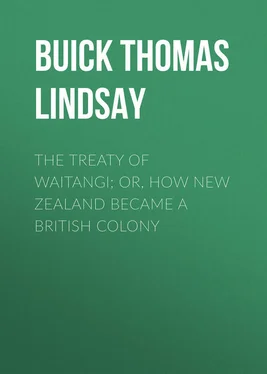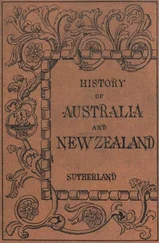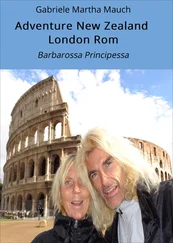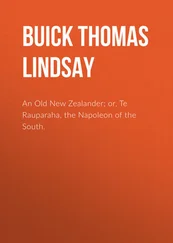Thomas Buick - The Treaty of Waitangi; or, how New Zealand became a British Colony
Здесь есть возможность читать онлайн «Thomas Buick - The Treaty of Waitangi; or, how New Zealand became a British Colony» — ознакомительный отрывок электронной книги совершенно бесплатно, а после прочтения отрывка купить полную версию. В некоторых случаях можно слушать аудио, скачать через торрент в формате fb2 и присутствует краткое содержание. Жанр: foreign_antique, foreign_prose, на английском языке. Описание произведения, (предисловие) а так же отзывы посетителей доступны на портале библиотеки ЛибКат.
- Название:The Treaty of Waitangi; or, how New Zealand became a British Colony
- Автор:
- Жанр:
- Год:неизвестен
- ISBN:нет данных
- Рейтинг книги:5 / 5. Голосов: 1
-
Избранное:Добавить в избранное
- Отзывы:
-
Ваша оценка:
- 100
- 1
- 2
- 3
- 4
- 5
The Treaty of Waitangi; or, how New Zealand became a British Colony: краткое содержание, описание и аннотация
Предлагаем к чтению аннотацию, описание, краткое содержание или предисловие (зависит от того, что написал сам автор книги «The Treaty of Waitangi; or, how New Zealand became a British Colony»). Если вы не нашли необходимую информацию о книге — напишите в комментариях, мы постараемся отыскать её.
The Treaty of Waitangi; or, how New Zealand became a British Colony — читать онлайн ознакомительный отрывок
Ниже представлен текст книги, разбитый по страницам. Система сохранения места последней прочитанной страницы, позволяет с удобством читать онлайн бесплатно книгу «The Treaty of Waitangi; or, how New Zealand became a British Colony», без необходимости каждый раз заново искать на чём Вы остановились. Поставьте закладку, и сможете в любой момент перейти на страницу, на которой закончили чтение.
Интервал:
Закладка:
It was therefore clearly the opinion of Mr. Wakefield that Mr. Stephen was a force to be reckoned with, and that whether he influenced it from the religious or the secular point of view, the Departmental head of the office was a powerful factor in moulding the policy which the Minister afterwards followed. But be that as it may, it still remains that from this date the Company and its colonising scheme received no quarter from the Colonial Secretary nor from the Department while he was at its head. Nothing daunted by official discouragement, the Company went steadily on with their arrangements; and within the year they had so far completed their plans that their pilot ship was ready to sail, all that was requisite being the extension of a helping hand to Colonel Wakefield, their pioneer representative, by Her Majesty's officers in Australia, in the event of things going badly with him. To this end, on April 29, Mr. William Hutt, who had now become chairman of the Company, Lord Petre and Mr. Somes waited upon Lord Normanby, preferring a request that letters might be given to the leader of their expedition, soliciting the good offices of the Governors of New South Wales and Van Dieman's land, should Colonel Wakefield require their aid. Their request was accompanied by a copy of the Company's instructions to Wakefield, all of which came as a violent surprise to the Colonial Secretary, who immediately pronounced with unmistakable emphasis, the Government's hostility to these unauthorised proceedings. He protested that this was the first he had heard of the Company's matured plans to proceed to New Zealand and there set up a system of Government independent of the authority of the British Crown, therefore it was impossible that he could do any act which might be construed into a direct, or even indirect, sanction of such a proceeding. He further made it plain that the Government could not recognise the authority of any agents whom the Company might send out to New Zealand, nor would they give future recognition to any proprietary titles to land within that country, which the Company might obtain by grant or purchase from the natives. Indeed, so far had matters, he said, now been pushed, that he had no option but to indicate that the time had arrived when Her Majesty must be advised by her Ministers to adopt one of the last of Lord Glenelg's recommendations, before he left the Colonial Office, 39 39 Vide his letter to Lord Palmerston, December 12, 1838.
and take measures without delay to obtain cession in sovereignty to the British Crown of such parts of New Zealand as are, or might be, occupied by British subjects, and that officers selected by the Queen, and not by the Company, would be appointed to administer the executive Government within such territory. "Under these circumstances," the Colonial Secretary concluded, "I must decline to furnish the Company with the introductory letters for which they apply."
This intimation was given to the Company in the dying days of April 1839, and by the 13th of June Lords Normanby and Palmerston had, after consultation with the Law Officers of the Crown, agreed not only that the moment was ripe for official action, but that the proper course to take was to send to New Zealand an officer with Consular powers, whose first duty would be to secure the cession in sovereignty from the chiefs. The territory so ceded was then to be annexed to New South Wales, the Consul to be raised to the rank of Lieut. – Governor, acting under the Governor of the Mother colony, but invested with sufficient authority to preserve law and order in the country. His salary of £500 per annum was at first to be a charge upon the revenues of New South Wales, to be refunded so soon as the necessary arrangements could be made for the collection of taxation in New Zealand.
On July 19 these proposals were confirmed by the Lords of the Treasury, whereupon Lord Palmerston penned the letter to Captain Hobson of which the opening paragraph of the previous chapter is a brief extract.
In the meantime a clipper brig of 400 tons, named the Tory had been quietly fitted out by the Company for a dash to New Zealand. She was armed with eight big guns, and as a precaution against a hostile reception, small arms were provided for all the members of the crew, a specially selected body of men. Under the command of Captain Chaffers, who had been round the world with Fitzroy in the Beagle , she left Plymouth Sound on May 12 (1839) and proving a smart sailer, crossed the equator twenty-six days out, the high land of the South Island being sighted in the vicinity of Cape Farewell on August 16. This pioneer ship of the Company's fleet carried in her cabin their official representative in the person of Colonel William Wakefield, and in her hold a full complement of pots, pipes, and Jews' harps, which that gentleman proposed to exchange as full value for the land he hoped to acquire by barter from the natives.
The sailing of the Tory was the New Zealand Company's challenge to the Government, and in any estimate of its subsequent policy this precipitate event must be accounted an important factor in endowing the Colonial Office with a vital force which had hitherto been sadly lacking.
CHAPTER III
FINDING A WAY
The favour of Ministerial selection for the onerous task of bringing New Zealand within the realms of Britain fell upon Captain Hobson, because his record in the Navy had justified the opinion expressed of him by Sir Richard Bourke, that he was an experienced and judicious officer. Moreover, his visit to the country in the Rattlesnake had given him a local knowledge of which few men of eminence and character were at that time possessed. There is no reason to suppose that the appointment was in any way a party one, and except that the new Consul was the victim of indifferent health, it was probably the best that could have been made at the time, its greatest justification being the complete success which attended his mission up to the time of his early decease. 40 40 Captain Hobson had acquired some distinction in the Navy by the capture of a band of pirates in the Mediterranean, the personal bravery displayed by him on that occasion being decidedly meritorious. He was afterwards engaged with the sloop-of-war Rattlesnake , and first attracted political notice by his report to the Government on the state of Society in New Zealand. Major Bunbury, who had considerable personal knowledge of him, describes him as an officer who wrote a good despatch, was fluent of speech, and was not without abilities, but had not the necessary grasp of thought to seize the main point of a question – to separate the grain from the chaff. He was very jealous of his authority and obstinate, particularly as disease made encroachment on his frame and intellect. He was of social habits and had the faculty of making private friends and also of creating public enemies. Mrs. Hobson is described as "an interesting person."
Captain Hobson left England in the H.M.S. Druid commanded by Lord John Churchill. He went out fortified for his task by a series of instructions which left little doubt that if Ministers had been slow to move, they had at least endeavoured to take a statesman-like view of the position when circumstances compelled them to act, the breadth of which can be best understood from the instructions themselves. After adverting to the social conditions existing in New Zealand, with which Captain Hobson was perfectly cognisant and which Lord Normanby assured him the Government had watched with attention and solicitude, the Colonial Secretary proceeded to explain the attitude which the Government had adopted in regard to this branch of Imperial policy.
We have not been insensible to the importance of New Zealand to the interests of Great Britain in Australia, nor unaware of the great natural resources by which that country is distinguished, or that its geographical position must in seasons, either of peace or war, enable it in the hands of civilised men to exercise a paramount influence in that quarter of the globe. There is probably no part of the earth in which colonisation could be effected with a greater or surer prospect of national advantage.
Читать дальшеИнтервал:
Закладка:
Похожие книги на «The Treaty of Waitangi; or, how New Zealand became a British Colony»
Представляем Вашему вниманию похожие книги на «The Treaty of Waitangi; or, how New Zealand became a British Colony» списком для выбора. Мы отобрали схожую по названию и смыслу литературу в надежде предоставить читателям больше вариантов отыскать новые, интересные, ещё непрочитанные произведения.
Обсуждение, отзывы о книге «The Treaty of Waitangi; or, how New Zealand became a British Colony» и просто собственные мнения читателей. Оставьте ваши комментарии, напишите, что Вы думаете о произведении, его смысле или главных героях. Укажите что конкретно понравилось, а что нет, и почему Вы так считаете.












